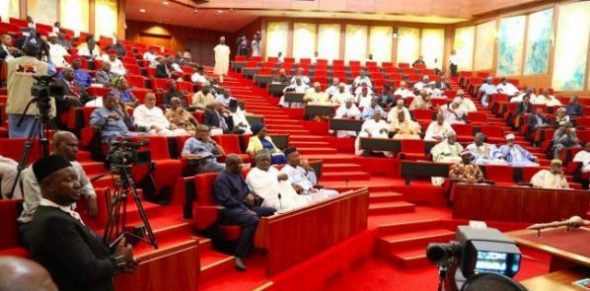Politics
Senate threatens agencies with zero allocation over failure to account for SWV allocation

One hundred ministries, departments, and agencies (MDAs) have been given a one-week deadline by the Senate to appear before it and provide an account of how they used the Service Wide Vote (SWV) allocations from 2017 to 2021.
The Senate President, Senator Ahmad Lawan (APC, Yobe North), threatened the 100 federal government-owned agencies with zero budget allocation in 2023 for not honoring invitations of its committee for explanations on service wide value, on Wednesday in Abuja, during plenary.
This was after raising a point of order raised by the Chairman, Senate Committee on Public Accounts, Senator Matthew Urhoghide (PDP, Edo South).
Lawan contended that the agencies must appear before the Senate to defend their budgetary decisions, that the National Assembly appropriates the funds, and that they must honor the Senate’s summons to provide justifications.
He continued by saying that anyone serving in public office and spending any cash appropriated by the people must be present, and anyone refusing to do so should resign.
READ ALSO:Senate passes bill to limit tax incentives after FIRS loses $2.9 billion to waivers
He said that in the next one week, “if the name of an agency is here, it should be invited and refusal to come, nothing should be given to the MDA in the 2023 budget.”
In his statement, Urhoghide invoked Sections 61(1), 88((and (2b); 89(1); 89(1) (c); and 89(2) of the 1999 Constitution as amended, as well as Order 42 on Personal Explanation, Rule 95(5)(a) of the Senate Standing Rules, to complain to his colleagues about the alleged refusal of the heads of the affected agencies to honor invitations sent to them by his committee for required appearance before it for explanations on service wide votes given to them by the Presidency totalling N1.9trillion.
Service Wide Vote, according to Urhoghide, is extrabudgetary spending used to make up for capital and recurring expense deficits that is not subject to examination by the Auditor General of the Federation and is not disclosed to several standing committees of the National Assembly.
Using provisions of the 1999 Constitution (as amended) as the basis for his complaints, the chairman of the Public Accounts Committee claimed that the heads of the affected agencies had repeatedly been invited to provide the necessary justifications for service wide vote expenditures from 2017 to 2021.
Join the conversation
Support Ripples Nigeria, hold up solutions journalism
Balanced, fearless journalism driven by data comes at huge financial costs.
As a media platform, we hold leadership accountable and will not trade the right to press freedom and free speech for a piece of cake.
If you like what we do, and are ready to uphold solutions journalism, kindly donate to the Ripples Nigeria cause.
Your support would help to ensure that citizens and institutions continue to have free access to credible and reliable information for societal development.
























